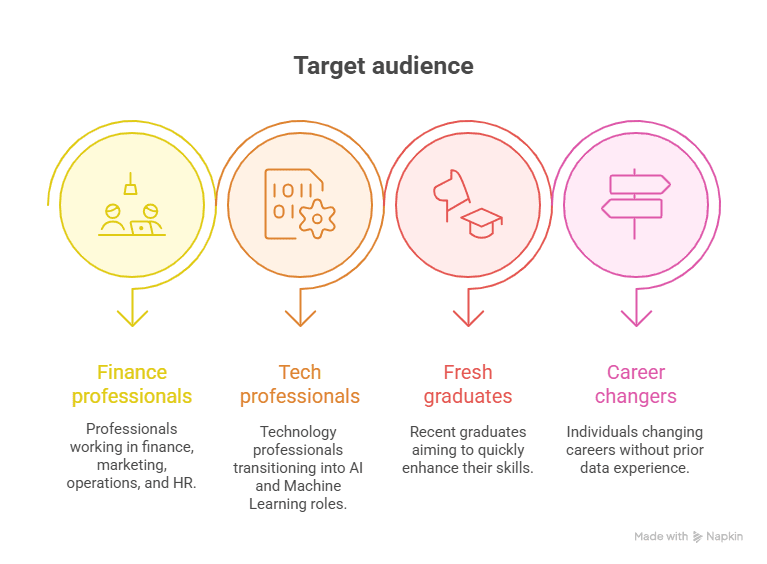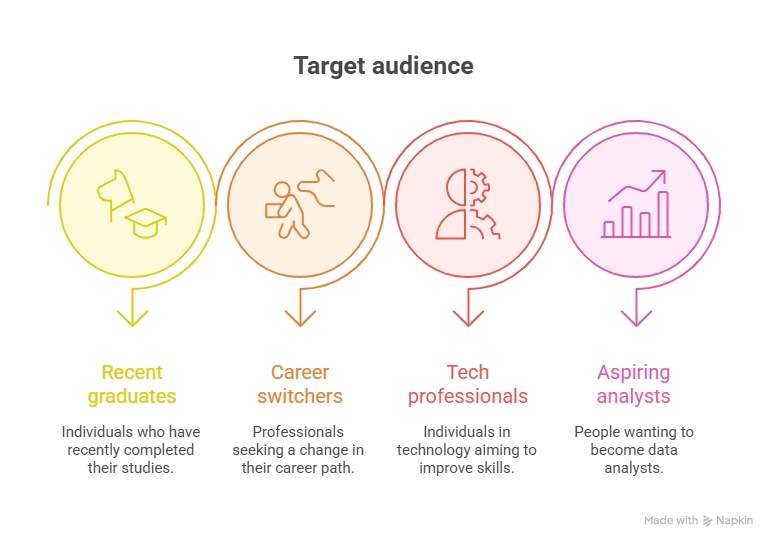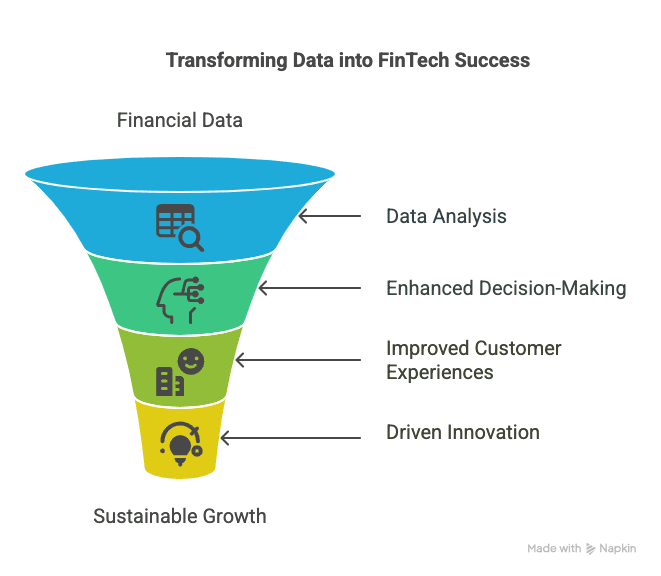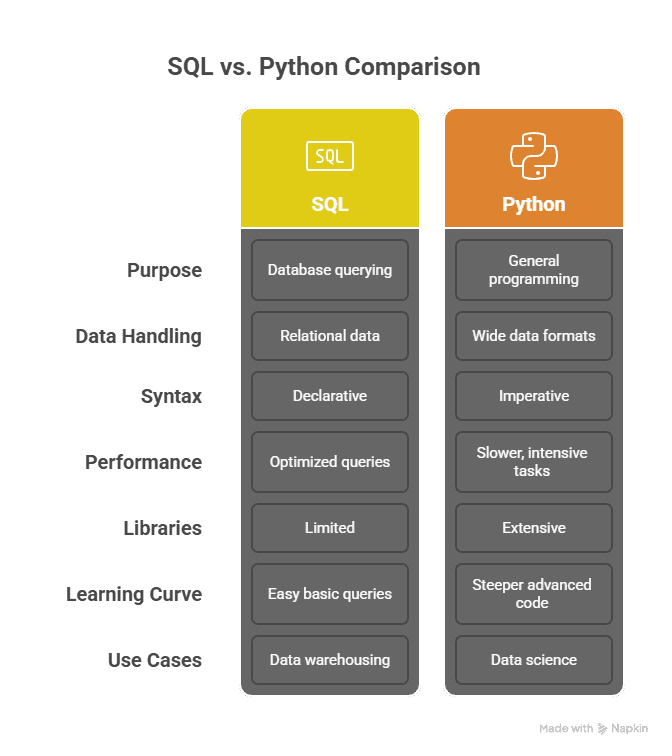Introduction
Want to land your dream job in data science? You’re not alone. With companies across industries doubling down on data-driven strategies, the demand for data scientists has exploded in India. But here’s the twist—just having a degree isn’t enough anymore. Recruiters are looking for something more: the right data science skills. If you’re asking yourself what differentiates one candidate from the resume ocean, more often than not it boils down to the quality of their skillset and its match with actual business requirements. In this blog, we will guide you through the most in-demand data science skills employers need and how you can learn them to accelerate your data science career advancement.
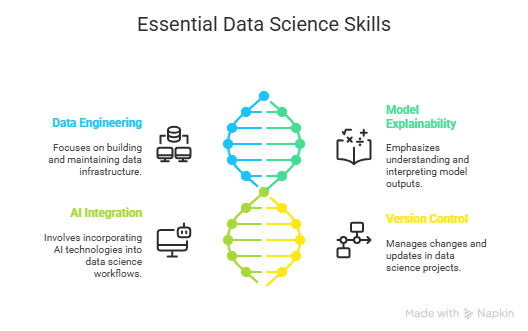
Table of Contents
- Essential Data Science Skills for 2025
- Understanding Data Science Job Requirements
- Most In-Demand Skills for Data Scientists
- Technical Skills for Data Science Success
- Programming Languages for Data Scientists
- Machine Learning Skills for Jobs
- Boosting Your Data Science Career Growth
- FAQs
- Key Takeaways
- Conclusion
Essential Data Science Skills for 2025
The world of data science continues to change rapidly, as do the skills needed by employers from applicants. While some skills have remained mostly the same, others are becoming mandatory with the introduction of new tools and technologies.
Here are some essential data science skills you should have in 2025:
- Data wrangling: Cleaning, sorting, and pre-processing raw data.
- Exploratory Data Analysis (EDA): Finding trends and outliers in datasets.
- Data visualization: Telling a story and presenting findings with tools like Tableau, Power BI.
- Model Deployment: Understand how to deploy models into production.
- Cloud Computing: Especially AWS, Azure, and Google Cloud.
These data science skills will not only help you become more technically competent – but will also improve your problem solving mindset, allowing you to think in the style of a data person.
Understanding Data Science Job Requirements
So, what are companies actually asking for in job descriptions? Many freshers and professionals make the mistake of assuming that learning Python or R is enough. But recruiters want a mix of technical prowess, business acumen, and communication skills.
Let’s break down common data science job requirements in a table:
| Requirement Category | Examples |
| Programming Skills | Python, R, SQL |
| Machine Learning | Regression, Clustering, Decision Trees |
| Business Intelligence | Tableau, Power BI |
| Cloud Platforms | AWS, GCP, Azure |
| Communication | Report writing, stakeholder presentations |
Keep an eye on job portals like Naukri, LinkedIn, or global ones like Glassdoor to stay updated on what employers are demanding.
Most In-Demand Skills for Data Scientists
The competition is real—and so is the opportunity. The most successful data scientists are those who develop a combination of domain knowledge and tech stack mastery. From statistical modelling to working on big data platforms, here’s what you should focus on.
Most in-demand skills for data scientists include:
- Data Engineering: Knowing how to build pipelines using tools like Apache Spark.
- Model Explainability: Understanding SHAP, LIME, and other interpretation techniques.
- AI Integration: Merging machine learning models into larger AI workflows.
- Version Control: Using Git to collaborate and manage code versions.
When these data science skills are part of your toolkit, you position yourself as an asset in any business environment.
Technical Skills for Data Science Success
Beyond theoretical understanding, your technical chops will be scrutinised during interviews and assessments. Technical skills form the backbone of any successful data scientist’s career.
Let’s look at the core technical skills for data science:
- Statistics & Probability: Hypothesis testing, A/B testing, distributions.
- Database Management: SQL queries, joins, indexing.
- Big Data Technologies: Hadoop, Spark, Kafka.
- APIs: RESTful APIs for model deployment.
- Scripting: Shell scripting for automation tasks.
Tip: Build projects using real-world datasets to strengthen these skills. Sites like Kaggle are great for practice.
Programming Languages for Data Scientists
You can’t name yourself a data scientist if you don’t know how to use at least – one programming language fluently. But most importantly.. you need to know when & how to use each language for each use case.
The most important programming languages for data scientists:
- Python: The number one language for machine learning, data cleaning, and data visualization.
- R: Excellent for statistical analysis and academic research.
- SQL: Essential for querying relational databases.
- Scala/Java: Often used in big data environments.
A well-rounded grasp of these tools adds immense weight to your data science skills portfolio.
Machine Learning Skills for Jobs
Machine learning isn’t just a buzzword anymore—it’s a job essential. From fintech to healthcare, every sector is integrating ML models to make smarter decisions. Your understanding of these algorithms can set you apart.
Machine learning skills for jobs include:
- Supervised Learning: Regression, classification, ensemble methods.
- Unsupervised Learning: Clustering, dimensionality reduction.
- Deep Learning: CNNs, RNNs, transformers.
- Model Evaluation: Precision, recall, F1 score, ROC curves.
The better your grasp on these concepts, the more confident you’ll be in interviews and real-world applications.
Boosting Your Data Science Career Growth
Acquiring skills is just the first step. Strategic learning, mentorship, and networking play a huge role in scaling your data science career growth. The key is to never stop learning and updating your toolkit.
Actionable tips to boost your data science career:
- Enrol in Certification Programs: Choose ones with real-world projects.
- Follow Industry Leaders: Stay inspired and updated via LinkedIn or Twitter.
- Contribute to Open Source: Collaborate on GitHub projects.
- Attend Webinars and Hackathons: Great for networking and experience.
Remember, growth in data science is exponential when you stay curious and proactive.
FAQs
Q1. What are the most important data science skills to learn first?
Start with Python programming, statistics, and SQL. These form the foundation of almost every data science role and are universally in demand.
Q2. Are soft skills relevant in a data science job?
Absolutely, communication, storytelling and managing stakeholders are extremely important for demonstrating data-driven insights effectively.
Q3. Which certification can someone use to reflect their data science skills?
The certifications available on Coursera, EdX or other platforms like Imarticus Learning will help you be noticed, these certifications will add credibility to your profile.
Q4. How do I showcase my machine learning skills?
You can showcase ML projects on GitHub or participate in competitions on Kaggle and write blogs or case studies on Medium.
Q5. How do I become job ready in data science, how long will this take?
With learning and practice the goal is achievable in 6–9 months, depending on your input and previous experience.
Q6. Which companies are hiring data scientists in India?
The top employers are TCS, Infosys, Accenture, Flipkart, and listings include Amazon and fintech companies like Razorpay and Paytm.
Q7. Is it necessary to know both Python and R?
Not necessarily. Knowing one language well is more valuable than knowing two superficially, though Python is more widely used in the industry.
Q8. Do I need a master’s degree for a data science career?
It helps but is not mandatory. Skill-based hiring is gaining traction. A strong portfolio can outweigh a formal degree.
Q9. What’s the best way to stay updated on data science trends?
Follow resources like Towards Data Science, Analytics India Magazine, and DataCamp blogs.
Q10. How important is domain knowledge in data science?
Very important. Understanding business context enhances the relevance and applicability of your models.
Key Takeaways
- Mastering data science skills is essential for cracking job interviews & thriving in the industry.
- Focus on building essential data science skills – from programming to storytelling.
- Understand data science job requirements thoroughly and tailor your profile accordingly.
- Learn and apply technical skills for data science through projects and hands-on practice.
- Boost your data science career growth with the right strategy, certifications, and networking.
Conclusion
The world of work will be driven by data, and businesses want people who not only have the right technical acumen but are also business-aware as well as verbal communicators. It takes the effort and time to acquire those data science skills which are most sought after at that point to make your job future-proof. If you’re a student weighing options or a working individual career-switching, the ideal skillset will stand you apart amidst a noisy marketplace. Get yourself updated, inquisitive, and most crucially, continue building.


